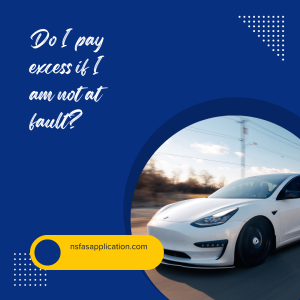Do I pay excess if I am not at fault?

Do I pay excess if I am not at fault?
Do I Pay Excess if I am Not at Fault in South Africa?
As a South African driver, getting involved in a car accident may be a stressful and upsetting experience, especially if you are not at fault. One of the most frequently asked issues in such scenarios is whether you will be required to pay an excess if you were not at fault for the accident. In this blog post, we’ll look at the answer to this question and offer tips on how to manage the procedure in South Africa.
What is an Excess?
An excess is the amount of money that you, as the policyholder, must pay towards a claim before your insurance company starts paying out. The excess is usually a fixed amount that is specified in your insurance policy, and it can vary depending on the type of policy and the insurance company.
Do I Pay Excess if I am Not at Fault?
In South Africa, the answer to this question depends on the specific circumstances of the accident and the terms of your insurance policy. If you’re not at fault, you may not have to pay an excess, but this is not always the case.
-
If the other party is fully insured: If the other party is fully insured and accepts liability for the accident, you may not have to pay an excess. In this case, the other party’s insurance company will typically cover the costs of the damages, and you won’t have to pay anything out of pocket.
-
If the other party is not insured or underinsured: If the other party is not insured or underinsured, you may have to pay an excess, even if you’re not at fault. This is because your insurance company may have to cover the costs of the damages, and you’ll be responsible for paying the excess.
-
If the accident is reported to the police: If the accident is reported to the police and the other party is found to be at fault, you may not have to pay an excess. In this case, the police report can serve as evidence to support your claim, and your insurance company may waive the excess.
How to Avoid Paying Excess if You’re Not at Fault
To avoid paying an excess if you’re not at fault, it’s essential to:
-
Report the accident to the police: Reporting the accident to the police can help to establish liability and provide evidence to support your claim.
-
Gather evidence: Gather as much evidence as possible, including witness statements, photographs, and video footage, to support your claim.
-
Notify your insurance company: Notify your insurance company as soon as possible and provide them with all the necessary documentation and evidence.
In conclusion, whether you pay an excess if you’re not at fault in South Africa depends on the specific circumstances of the accident and the terms of your insurance policy. By understanding the process and taking the necessary steps to report the accident and gather evidence, you can minimize the risk of paying an excess and ensure that you’re not unfairly penalized for someone else’s mistake. Always review your insurance policy carefully and ask questions if you’re unsure about any aspect of your coverage.
Related Links
What is included in a comprehensive?
What is personal accident cover?
Which is not covered in personal accidents?
How much is personal accident cover?
Do I need driver injury cover?
Do I need injury insurance?
What is hire car cover?
What is an excess in insurance?